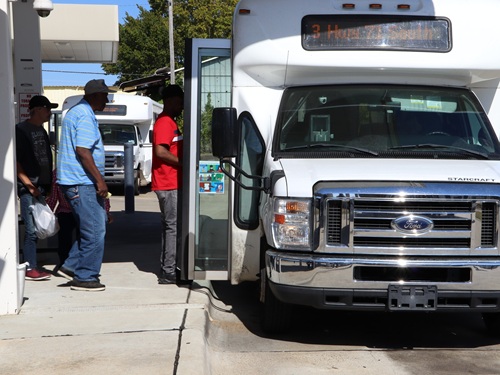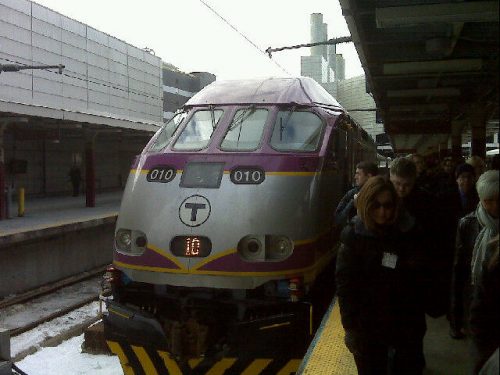The Massachusetts Bay Transportation Authority – a division of the Massachusetts Department of Transportation – made major adjustments to its service schedule on March 23 to accommodate the travel needs of “essential workers” such medical professionals and grocery store workers while at the same time coping with an overall decline in ridership.
[Above photo by the MBTA.]
The MBTA modified its commuter rail “reduced service” schedule to allow for five trains to arrive in Boston prior to 7 a.m., in order to provide medical professionals and emergency responders that rely on public transportation for traveling to and from work with enough time to meet to shift changes at hospitals and other medical facilities.

Meanwhile, train schedules were further modified to support targeted periods of peak travel while providing options for off-peak travel throughout the day – all while decreasing the overall number of trains in operation, as transit ridership has dropped nearly 60 percent due to the Coronavirus or COVID-19, according to data collected and analyzed by urban mobility application Moovit.
“The MBTA has announced additional service revisions in a continuing effort to protect the health and safety of [its] customers and workforce, and to preserve transit services for those who are essential to slowing the spread of COVID-19 or otherwise must travel for purposes that are absolutely necessary,” noted Steve Poftak, MBTA’s general manager, in a statement.

“The MBTA’s recent service revisions are in keeping with the broader strategy to slow the spread of COVID-19, and to ensure health care workers, grocery store employees, and others who play key roles in keeping everyone safe, can continue to do so,” he added.
Other state departments of transportation with transit responsibilities are also making similar service adjustments.
The Washington State Department of Transportation, for example, reduced service of Amtrak Cascades trains to two daily roundtrips between Seattle and Portland effective March 25 due to low ridership.

The agency noted in a statement that Amtrak Cascades trains carry an average of 2,300 people per day and as many as 3,600 each day during peak periods. Currently, however, less than 300 people per day are traveling on the Cascades trains; a more than an 85 percent reduction in ridership.
MBTA’s Poftak also noted that “critical to our success” in sustaining transit services is a combination of providing service that meets the needs of employees essential to combating COVID-19, keeping up enhanced protocols for cleaning and disinfecting of vehicles and high-contact surfaces, and continuing to request that customers to minimize their travel to only what is absolutely necessary,” he said.
To that end, MBTA said it is continuing to deploy “enhanced cleaning and disinfecting protocols” that include disinfecting all fleet vehicles – buses, trolleys, subway cars, commuter rail coaches, and ferries – every 24 hours, while cleaning all high-contact surfaces such as handrails, fare gates, and fare vending machines in subway stations once every four hours.

Amtrak and other public transit agencies – notably those operated by the Connecticut Department of Transportation – are engaged in similar cleaning efforts.
MBTA redoubled its sanitization efforts after three of its bus drivers tested positive for COVID-19 on March 25.
“We are disinfecting the employees’ workspace, vehicles, and equipment that they may have come into contact with, Poftak added in a separate statement.
 States
States
Nick Donohue Appointed Virginia’s Secretary of Transportation
December 12, 2025 States
States

